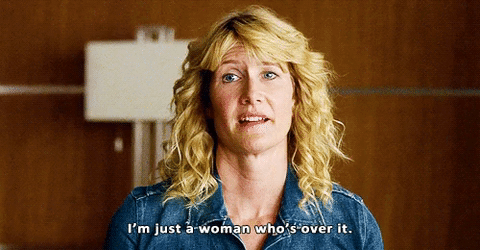This essay originally appeared in the September 26, 2019 issue of The Content Technologist with the email subject line "Your content business is not a war" and a review of content intelligence tool Buzzsumo.
Below: My ideas around abundance aren’t my own. I’ve been chewing on others’ thoughts for years, and if this were a dissertation I would find exact passages and cite them. But this is a newsletter, and so I can only tell you their likely origin: adrienne maree brown’s Emergent Strategy. Nick Montgomery and carla bergman’s Joyful Militancy. Events produced by Pollen. Elena Ferrante’s Neapolitan novels. The radical self-love that Lizzo creates in her music and entire presence. Conversations with my own brilliant friends.
I guess “the abundance mindset” is a thing from Stephen Covey, who I’m lukewarm on because I’ve seen people who champion Covey make horrible, destructive decisions! It’s popular enough to have its own Wikihow. My take on it is slightly different (ultimately far more critical of people in power and neoliberal business structures), but hey! Let’s go with it! More people thinking in abundance is generally a good thing!
I’m throwing around unpolished concepts today in the hopes I can one day polish them. I welcome your thoughts and feedback.
So. Let’s begin.
The content business and the abundance mindset
(For the moment, we’re putting aside the idea that “big tech” exists and is a problem for content businesses. For this exercise, let’s consider FAMGA as tools rather than competitors who have unnecessarily consolidated a massive amount of money and power. Just… put them aside for this exercise.)
This one’s for the CXOs, the directors, the owners, the indies out there: Start with the assumption that you have all the physical/material/digital resources you need. If you are here, now, you are doing just fine.
Of course you want to do better. Of course. You are goal-oriented. You are a maker.
You want to improve. What’s the next step?
In most capitalist/neoliberal mindsets, it feels natural to look outward. “What are my competitors up to and how can I beat them?” You are suspicious that others will find out your secrets, that someone else may win. They may discover your strategy; they may impede on your share of voice. You look at people in other businesses as enemies. “Loose lips sink ships,” you tell your team. “Beat other random startup or disruptor! Be first! Slam the competition!”
But here’s the thing: you’re not actually at war. You’re just running a creative business. Like it or not, you’re small potatoes. Small potatoes with an outsized amount of power, but small potatoes. And, like it or not, the world out there likely already knows your secrets because you wear them on your sleeve.
![Kelly and Brenda from 90210 are wearing the same dress to the dance! They give each other real bitch looks. [gif] [alt]](https://cdn.substack.com/image/fetch/w_1100,c_limit,f_auto,q_auto:good,fl_lossy/https%3A%2F%2Fbucketeer-e05bbc84-baa3-437e-9518-adb32be77984.s3.amazonaws.com%2Fpublic%2Fimages%2Fb04131e3-696f-4962-aa3b-6c015252743b_480x360.gif)
A competitive mindset is endemic in the media and agency businesses where I’ve worked in the past. It’s always felt gross to me. It’s myopic and ersatz. Agencies give each other side-eye at client meetings instead of collaborating for the best results possible. Legacy media companies point fingers at silly ghost competitors like “market forces” or “influencers” when, actually, the real issues are rooted in outdated ideas of competition, a massive misconception of how their audience interacts with technology, and fear of the unknown.
Usually the competitive mindset distracts from internal issues and causes fear-based decision-making: if your business is concerned about what a competitor is doing, you’re not focused on internal changes that will reward you tenfold.
The competitive mindset distracts you from seeing the world as it really is. It tells you “don’t have time” to see the value of other voices. The abundance mindset assesses the world as it is now. It assumes your competitors are doing good things. It assumes you are capable of doing great things, right now, once you participate in the conversation.
![Two cats are on a treadmill but they are running at different paces. [gif]](https://cdn.substack.com/image/fetch/w_1100,c_limit,f_auto,q_auto:good/https%3A%2F%2Fbucketeer-e05bbc84-baa3-437e-9518-adb32be77984.s3.amazonaws.com%2Fpublic%2Fimages%2F53d12f19-5acc-47f4-8eeb-de7278d114f1_346x237.gif)
What if you look to your employees’ perspectives? What if you ask someone with fresh eyes? What if your response is predicated on active listening rather than dictating?
What if you spend time figuring out what people like about influencers?
What if you assume you have much to learn from your direct competitors?
Brilliant connector Heather Soladay Olson introduced me to the term “coopetitor,” which I love. You’re colleagues first, working in the same space in the same market. You’re occasionally competing for the same business, technically, but you each have unique values and voices and advantages that can match you with different sets of clients. Be more concerned about matching with your ideal clients than wasting energy on taking down others.
What if you have everything you need right in front of you — a wealth of data, a team, a computer and internet access that can provide massive amounts of free data and networking?

When you plan an event, one of the things you learn is “everyone who needs to be here is going to be here.” You don’t spend your time longing for someone who couldn’t attend. You have everything you need to make your event or content or website accessible to the people who want to read it.
How do you do that better? It’s not by obsessing over what some other business or trend has identified as their own “enough.” Instead, be a scrappy motherfucker and a decent person and start listening. Abundance assumes every voice has value, regardless of their experience or seniority. To your audience, to your network, to people in communities you don’t normally listen to. Truly respond to them.
The other core tenet to thinking abundantly: give as much as you take. Build networks with others who are making similar connections.
You don’t need anything new, and you certainly don’t need to “beat” anybody. That mindset is weirdly violent and unnecessary. And when you say “win,” what exactly are you winning? Generally the answer is “more” and “more” isn’t some finite outcome like a trophy.
The content business isn’t football. It’s not war. It’s connection in abundance.
You have resources and power in abundance. Transform that into work that truly connects, that takes risks, that joins conversations and adds value to the world.
Hand-picked related content







